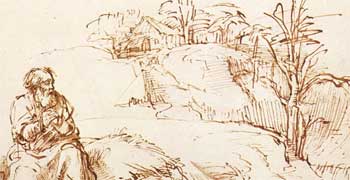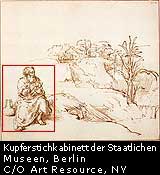
Building Trust
Whereas in the first scene, Elijah hid locally, in the second scene he must leave the borders of the Land of Israel and flee to the Phoenician city of Zarephath of Sidon. Phoenicia is the home of the Tyrian Baal whose worship was introduced to Israel by Jezebel, the wife of King Ahab. The word of the prophet of Israel affected the land of Baal, the Canaanite god of fertility as well. God's power knows no bounds.
Elijah is sent to Zarephat not only to witness that power but also to undergo a personal transformation. In Wadi Cherith he was sustained through God's miracles in nature. In Zarephath, he must rely on people and they must rely on him. God instructs him to find an impoverished widow who will provide for him:
And the word of the Lord came to him: "Go at once to Zarephath of Sidon, and stay there; I have designated a widow there to feed you." So he went at once to Zarephath. When he came to the entrance of the town, a widow was there gathering wood. He called out to her, "Please bring me a little water in your pitcher, and let me drink." As she went to fetch it, he called out to her, "Please bring along a piece of bread for me." "As the Lord your God lives," she replied, "I have nothing baked, nothing but a handful of flour in a jar and a little oil in a jug. I am just gathering a couple of sticks, so that I can go home and prepare it for me and my son; we shall eat it and then we shall die." Don't be afraid," said Elijah to her. "Go and do as you have said; but first make me a small cake from what you have there, and bring it out to me; then make some for yourself and your son. For thus said the Lord, the God of Israel: The jar of flour shall not give out and the jug of oil shall not fail until the day that the Lord sends rain upon the ground." She went and did as Elijah had spoken, and she and he and her household had food for a long time. The jar of flour did not give out, nor did the jug of oil fail, just as the Lord had spoken through Elijah.
(IKings 17:7-16)
I Kings chapter 17 is Elijah's rite of prophetic initiation. The events he experiences are intended to teach him not only of his dependence upon the Almighty, but about his role as a prophet among the people. In his encounter with the Zarephite widow he is placed in situations where he must build trust. Elijah requests that she make him the first cake with the little flour she has left. The exchange between the two makes it clear that she is uneasy about feeding him at the cost of her own life and that of her son. From the perspective of the prophet, this action will precipitate the miracle he will presently perform. From the perspective of the widow it will result in certain death. Elijah grapples with the ultimate challenge facing the prophet: to convince the people to put their trust in him and in God despite all logical considerations to the contrary. He is successful in convincing the widow. Her faith is rewarded with a miraculous jar of flour and a never-ending jug of oil. Yet far more important is the bridge of mutual trust and understanding, which was built between Elijah and the widow through this experience.
Lessons Taught and Lessons Learned >>
Elijah the Prophet by the Brook of Cherith
|